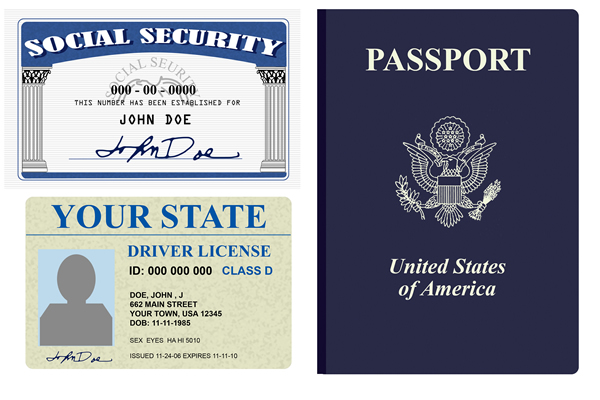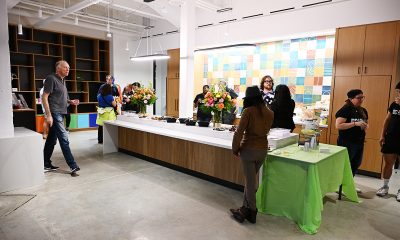Local
Money race underway in Maryland
Up to $7 million needed for marriage fight; O’Malley to host beach fundraiser
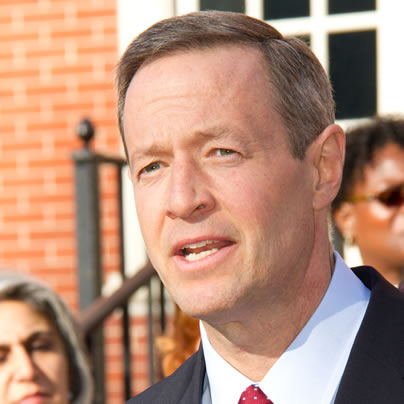
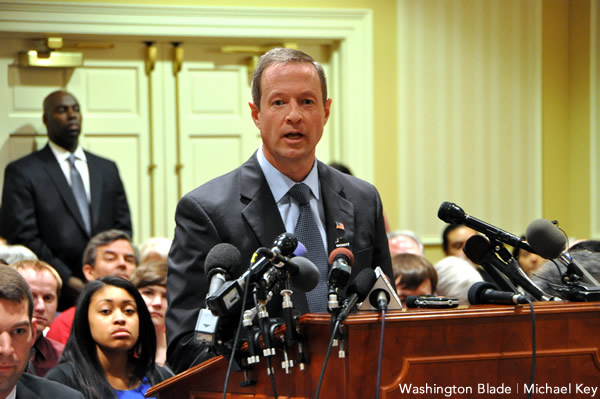
Maryland Gov. Martin O’Malley and House Speaker Michael E. Busch are scheduled to co-host a June 26 fundraiser in Ocean City for Marylanders for Marriage Equality. Tickets for the event start at $1,000. (Washington Blade photo by Michael Key)
Marylanders for Marriage Equality is confident it can run a “winning campaign” to defeat a voter referendum seeking to kill Maryland’s same-sex marriage law on a budget of between $5 million and $7 million, according to the organization’s campaign manager, Josh Levin.
“We feel good about that budget,” Levin told the Blade last week. “We feel like we’ll be able to do the things we need to do thanks to the effort of our coalition and our partners who are going to be talking to voters, who are going to be helping us in ways that I’m not sure are always the case in other campaigns.”
Levin’s comments came at a time when virtually all of the state’s political observers believe opponents of the marriage equality law will obtain far more than the number of petition signatures they need to place the referendum on the ballot in the Nov. 6 election.
The referendum language, which the Maryland State Board of Elections won’t draft until August, is expected to ask voters to approve or overturn a law passed earlier this year by the Maryland General Assembly legalizing same-sex marriage. The law also allows churches and religious organizations to refuse to perform such marriages.
Both sides have begun raising and spending money to wage their respective campaigns for and against the same-sex marriage law. But Maryland’s election law doesn’t require the campaigns to publicly disclose the amount of money they have raised or spent until Oct. 12, when the first of three campaign finance reports for a state referendum is due to be filed, according to Jared DeMarinis, a spokesperson for the election board.
He said the second campaign finance report must be filed on Oct. 26 and the third on Nov. 27, 21 days after the election.
DeMarinis said the election law requires organizations seeking to place the marriage equality law on the ballot in a referendum to file finance reports during the petition gathering process, which began earlier this year and continues through June 30. Those groups were required to disclose the receipt and expenditure of funds linked solely to the petition process during the past several months.
In what may come as a surprise to advocates of campaign finance disclosure laws, Marylanders for Marriage Equality isn’t required to disclose the amount of money it raises and spends and the names of its first round of donors until Oct. 12. The identity of its donors that contribute money between Oct. 26 and Election Day on Nov. 6 won’t have to be disclosed until 21 days after the election.
When asked last week by the Blade how much the campaign has raised so far, Levin said, “I don’t think I’m going to comment on that one.”
Some LGBT rights advocates in Maryland and elsewhere have expressed concern that Marylanders for Marriage Equality will need as much as $10 million to $12 million to wage an effective campaign to defeat the referendum and allow the same-sex marriage law to take effect.
These advocates, most of whom spoke to the Blade on condition that they not be identified, said Maryland’s marriage equality campaign will be competing for big donors and other contributors with the marriage equality campaigns in Maine, Minnesota and Washington State, where similar marriage referendums will be on the ballot in November.
The big donors, both gay and LGBT-supportive allies, are also being lobbied heavily to make large contributions to President Obama’s re-election campaign, placing further strain on the pool of funds needed by the pro-same-sex marriage campaigns.
“I don’t see Maryland having a very easy time pulling $10 million out to run this,” said Andy Szekeres, a professional fundraiser from Denver, who’s gay.
Szekeres is the former partner in a Denver-based fundraising company that raised more than $37 million for various political campaigns over the past several years.
“I think they’re grossly underestimating the resources that they’re going to need,” he said of Marylanders for Marriage Equality.
According to Szekeres, who was hired last year to help the statewide LGBT group Equality Maryland boost its fundraising efforts, the marriage equality side in Maryland must purchase TV ads in the expensive Washington, D.C. and Baltimore media markets.
He said he sees no evidence so far that the campaign has begun to buy and reserve TV ad time now, when the cost is lower than it will be in September and October, when the referendum campaign heats up and the Obama campaign and Maryland congressional candidates flood the airways with TV commercials.
Evan Wolfson, executive director of the national marriage equality advocacy group Freedom to Marry, said his group is “deeply embedded” in the marriage referendum campaigns in Maine, Minnesota, and Washington State and is helping those campaigns raise money. He told the Blade that the money needed to win marriage equality in those three states “will well exceed $25 million.”
He said Maryland’s marriage equality campaign will need “$10 million plus” to successfully fend off the referendum seeking to kill the state’s same-sex marriage law.
Wolfson has declined to comment on why Freedom to Marry has not joined the coalition of groups that that formed Marylanders for Marriage Equality. Campaign finance reports filed in Maine, Minnesota, and Washington show that Freedom to Marry has contributed thousands of dollars to the marriage equality campaigns in those states.
Levin and other officials with Marylanders for Marriage Equality dispute Szekeres’ and Wolfson’s assessment of the campaign’s fundraising needs, saying they believe they will have the resources to run an aggressive and effective grassroots campaign throughout the state.
“I’m not worried,” said Levin. “We’ve got a lot of folks around the country who are working on this issue and we’ve got four states where it’s on the ballot. And I think that supporters around the country are going to look at all four states. Hopefully they’ll support all four.”
Levin pointed to a poll last month commissioned by the campaign and conducted by the firm Public Policy Polling showing support for the same-sex marriage law leading among likely voters in Maryland by a margin of 57 percent to 37 percent. The same poll showed the marriage equality side leading among black voters in the state by a margin of 55 percent to 36 percent.
The poll findings, released on May 24, showed a dramatic increase in support of same-sex marriage by black voters following President Obama’s announcement that he and first lady Michelle Obama believe gay and lesbian couples should be allowed to legally marry.
Although the Public Policy Polling poll was commissioned by Marylanders for Marriage Equality, officials with the group note that a separate ABC News-Washington Post poll released around the same time found that 59 percent of blacks across the country expressed support for same-sex marriage.
“I think we’ve opened some eyes and changed some minds about Maryland here in the last couple of months,” Levin said. “Our poll numbers are probably the best in the country of the states where we are looking at this issue on the ballot right now.”
He added, “I know that I’m learning from my fellow campaign managers in the other states about what’s working there. We’re talking. We’re trying to work together. It’s not a rivalry. It’s a partnership. We all want to move this forward.”
Marylanders for Marriage Equality spokesperson Kevin Nix also points out that the group’s coalition partners are especially influential and knowledgeable on Maryland politics. They include the NAACP of Maryland, the ACLU of Maryland, Equality Maryland, the Human Rights Campaign, the National Gay and Lesbian Task Force, and the Service Employees International Union (SEIU) of Maryland, among other organizations.
LGBT advocates say the marriage equality side is likely to benefit from Maryland’s status as a solid Democratic state expected to vote strongly for Obama in the presidential election taking place at the same time as the marriage referendum. With polls showing that Democratic voters in general and Obama voters in particular tend to support same-sex marriage rights at higher levels than other voters, the presidential election will likely be a major boost to the campaign in favor of Maryland’s marriage equality law.
Polls conducted earlier this year also showed that as many as 30 percent of Maryland voters saying they plan to vote for Republican presidential candidate Mitt Romney also support same-sex marriage.
LGBT advocates in Maryland are also hopeful that Gov. Martin O’Malley, who enjoys widespread popularity throughout the state, will follow through with his promise to campaign vigorously in support of the same-sex marriage law and help raise money for the campaign. O’Malley has been credited with playing a key role in persuading the legislature to pass the law.
O’Malley’s chief fundraising consultant, Colleen Martin Lauer of the fundraising firm Martin-Lauer Associates, is working with the campaign, Lauer told the Blade. She declined to provide details on what her firm is doing, deferring inquires to the campaign.
O’Malley and Maryland House Speaker Michael E. Busch (D-Anne Arundel County) are scheduled to co-host a June 26 fundraiser in Ocean City for Marylanders for Marriage Equality. According to the Washington Post, tickets for the event start at $1,000.
Szekeres said he’s rooting for the success of the Maryland campaign as well as the pro-marriage equality campaigns in Maine, Minnesota and Washington. But he said other states have had similarly strong coalitions, with polling numbers showing the same-sex marriage side ahead. He notes that same-sex marriage has lost in each of the 32 states that have had ballot measures on the issue.
The 2008 approval of California’s Proposition 8, which overturned that state’s gay marriage law, and the 2009 defeat of a same-sex marriage law approved by the Maine legislature that year were especially heartbreaking, Szekeres and others familiar with those ballot measures said.
California voters approved Proposition 8 by a margin of 52 to 48 percent following polling numbers showing the marriage equality side was ahead. Polls showed that Maine’s same-sex marriage law would survive the referendum vote shortly before voters rejected the law by a margin of 53 to 47 percent.
Opponents of a Maine same-sex marriage law passed by the state legislature initiated the 2009 referendum, which killed the law before it took effect. This year’s referendum in Maine was initiated by same-sex marriage supporters, who want Maine to become the first state to put a same-sex marriage law in place through a popular election.
“We lose these things 52 to 48 percent across the country,” said Szekeres. “I’ve been at these things and our polling showed we were much higher in Maine [in 2009] than we were. People lie to pollsters. They don’t want to be bigots to the pollsters but they are when they go vote.”
He and others familiar with same-sex marriage ballot campaigns have said TV ads by opponents that allege that gay marriage is harmful to children and the traditional family continue to succeed in persuading a majority of voters to turn against marriage equality.
“Again, if they think they can run this on a shoestring budget because 57 percent of the people six months out from the election tell pollsters they support us, that’s not going to happen,” said Szekeres in discussing the Maryland referendum. “There will be a lot of negative advertising and negative advertising works. And we just don’t seem to have an effective response.”
Nix said Marylanders for Marriage Equality retained the D.C.-based national advertising firm Dixon-Davis Media Group to prepare the campaign’s TV ads on behalf of the same-sex marriage law.
The firm’s website describes itself as a “full-service strategic communications company and advertising agency serving Democratic candidates, campaigns and causes.”
Nix said the campaign has also retained the Hart Research polling company to conduct internal polls to help the campaign develop the best possible messages for persuading voters to support marriage equality.
Matthew Crenson, professor emeritus of political science at Johns Hopkins University in Baltimore, said he has observed a “shift in the electorate” that is likely to break the gay marriage losing streak on ballot measures.
“I think there’s a better than 50-50 chance that Maryland will become the first state to approve gay marriage in a referendum,” he said.
“One decisive event was when the NAACP endorsed [marriage equality] because African Americans in Maryland, especially those closely attached to churches, have traditionally been opposed to gay marriage and gay rights,” he said.
“But the NAACP defined this as a civil rights issue, which is similar to the kind of issues that African Americans have raised in the past,” he said. “And I think that introduced a kind of shift in the electorate that makes it more than likely that [same-sex marriage] will pass.”
Maryland political observer Michael J. Wilson, a Montgomery County resident and former executive director of the national group Americans for Democratic Action, said he too senses a shift in the direction of voters upholding the same-sex marriage law.
“I think there’s reason to be hopeful,” he said, adding that the ability of the marriage equality side to turn out their supporters at the polls will be a crucial factor in the outcome.
“In Maryland, if you carry Baltimore City, Baltimore County, Montgomery County, and Prince George’s County by a big enough margin, you win a statewide election,” Wilson said. “If you carry those big counties you can win the state, even if the other counties go 60 to 40 against you.”
Michael K. Lavers contributed to this report.
World Pride 2025
Pabllo Vittar to perform at WorldPride
Brazilian drag queen, singer, joined Madonna on stage in 2024 Rio concert

A Brazilian drag queen and singer who performed with Madonna at her 2024 concert on Rio de Janeiro’s Copacabana Beach will perform at WorldPride.
The Capital Pride Alliance on Thursday announced Pabllo Vittar will perform on the Main Stage of the main party that will take place on June 7 at DCBX (1235 W St., N.E.) in Northeast D.C.
Vittar and Anitta, a Brazilian pop star who is bisexual, on May 4, 2024, joined Madonna on stage at her free concert, which was the last one of her Celebration Tour. Authorities estimated 1.6 million people attended.
District of Columbia
$3.7 billion RFK stadium proposal draws support from Team DC
Washington Commanders ‘proud’ to champion LGBTQ community
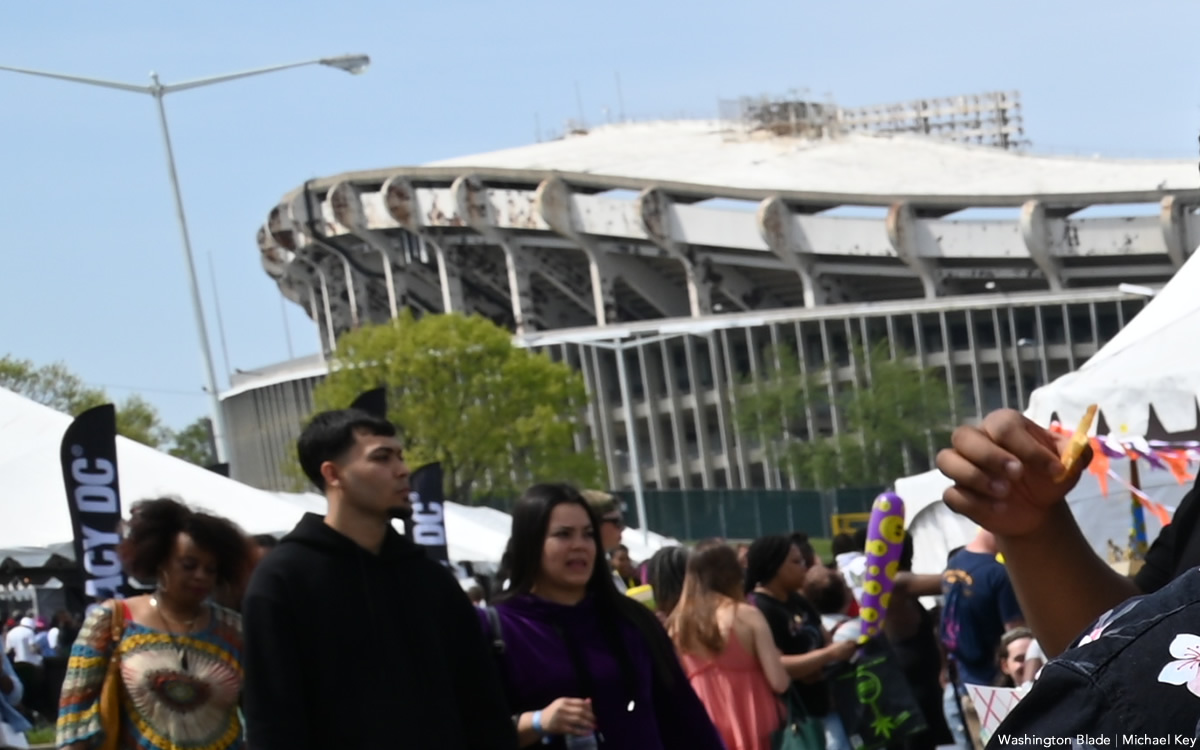
Miguel Ayala, president of the D.C. LGBTQ sports organization Team D.C., has expressed support for the $3.7 billion deal reached between Mayor Muriel Bowser and the Washington Commanders football team to bring the team back to D.C. in a redeveloped site on the grounds of the city’s long shuttered RFK stadium.
With the deal calling for the city to provide $1 billion in taxpayer funds for infrastructure related costs for the massive redevelopment project — and with the Commanders to provide the remaining $2.7 billion — as of this week the deal did not have majority support on the D.C. Council, which must vote to approve it.
Ayala’s support for the project on behalf of Team D.C. raises the question of whether members of the city’s influential LGBTQ community might play some role in urging the D.C. Council to approve the project.
The proposal comes at a time when the Washington Commanders team includes a message of support for the LGBTQ community on its website. The message follows its hosting last October of its 4th annual LGBTQ Pride Night Out at the Commanders game against the Cleveland Browns.
“The Washington Commanders are proud to champion the LGBTQ+ community and its allies,” the team states on its website. “Through the unifying power of sports, we aim to create a culture where all feel welcome and celebrated.”
In a statement released to the Washington Blade, Ayala points out that the Commanders are among every D.C.-based professional sports team that hosts a Pride Night Out event, which Team DC helps to organize.
“Each year, our events have grown stronger, with vibrant tailgates, on-field celebrations, and powerful moments that shine a spotlight on our community,” Ayala said. “We can’t wait to kick off our first Night Out at the Commanders Stadium in 2030.”
He was referring to plans by the Commanders organization and the D.C. mayor’s office to have the stadium deal approved by the D.C. Council in July, with construction of the new stadium to begin then, and with a planned completion in time for the 2030 professional football season.
Ayala also points out that the RFK stadium grounds currently serve as home to LGBTQ-related sports activity, including the D.C. Gay Flag Football League and the D.C. Front Runners group. He added that the RFK grounds will serve as the playing fields for this year’s WorldPride Capital Cup sports competition, where LGBTQ rugby and soccer teams from around the world will compete.
“This new stadium will be more than just a field – it will be a powerful new addition to the vibrant, diverse, and proud communities we champion every day,” he said in his statement.
At an April 28 news conference, Bowser, Washington Commanders owner Josh Harris and other city officials provided details of the stadium project, noting that it includes a massive development of the new stadium and the surrounding 180 acres of land.
In addition to the 65,000-seat domed stadium, officials said the project would include 5,000 to 6,000 residential housing units, with 30 percent designated as “affordable” for low- and moderate-income residents. They said the project would also include parks and recreation areas, hotels, restaurants, retail, and neighborhood amenities.
“As we focus on the growth of our economy, we’re not only bringing our team home, but we’re also bringing new jobs and new revenue to our city and to Ward 7,” Bowser said in a statement
Opponents of the project, including D.C. Council Chair Phil Mendelson (D-At-Large), have said they don’t believe the city should use its own funds for a stadium and the related development.
So far, just four Council members have expressed support for the project. Mendelson and two other Council members have expressed opposition, and the remaining five have not yet said whether they would vote for or against it. The project needs seven of the current 12-member Council for it to be approved.
Council member Zachary Parker (D-Ward 5), the Council’s only gay member, who initially had not taken a position on the proposal, this week said he was looking at the project more favorably, according to news media reports.
District of Columbia
Welcome home: DC LGBTQ Center opens its doors to healing and hope
The 6,671 square foot DC LGBTQ Center will offer a wide range of resources for LGBTQ individuals in need – including mental health services, job readiness programs, cultural events, and community support groups, all under one roof.

On a sunny spring day in Washington’s Shaw neighborhood, the once empty Holzbeierlein Bakery warehouse now showcases energy, pride, and the sounds of chosen family coming closer together. After years in a less-than-perfect space on 14th Street, the DC LGBTQ community finally has a new home at the DC LGBTQ Center—and Executive Director Kimberley Bush says it’s more than a building. It’s a promise.
That promise, Bush explained to the Washington Blade on April 26—the day of the new LGBTQ Center’s opening—may change depending on who is being uplifted by the DC Center, but at its core remains the same goal: a thriving LGBTQ community in the nation’s capital. The commitment to the DC LGBTQ community is able to grow more connected and stronger, she explained, as more resources, space, and funding become available for the DC Center.
“This is a glorious home,” Bush said, beaming as groups of community members walked in under the giant inflatable rainbow at the Center’s doors. “It’s our new home. Today was a whole day of welcome home. This space has been an amazing endeavor for a long time, one that we’ve always known we’ve needed. This is space that we need for our LGBT siblings in need—and it’s amazing when your intentions match your efforts.”
The DC Center has long worked to “educate, empower, uplift, celebrate, elevate, and connect” the LGBTQ community from its former location at the Reeves Center. But now, in its new space at 1828 Wiltberger St., N.W., these efforts are more visible, accessible, and impactful than ever before.
“This space is a model that is new, that we are creating,” Bush said as groups of DC Center supporters chatted with Etta James’s “At Last” filling the hallways. “There is, I believe, no other LGBTQ+ community center in the country that not only has its own life and supportive services in its building, but is also co-housed with other organizations. A lot of community centers try and do it all, but that’s not what we wanted. We wanted to be able to bring everybody together under one roof, to be able to have that whole life supportive services center like one-stop shopping. We didn’t want to take over anything anyone else did. We don’t want to take away the dollars those organizations have to do what they do for the community. We want us all to be together. So that’s what we are. We’ve been able to now expand into almost 7,000 square feet of space.”

The new DC Center features a variety of functional spaces designed to meet the diverse needs of the LGBTQ community. It includes office space for up to nine additional partner organizations, creating a hub for collaboration and support. Local and integral LGBTQ organizations like SMYAL, Team DC, and HIPS are some of the groups taking advantage of the space.
“People can be spread out,” Bush said about the opportunity for these LGBTQ-specific organizations to have a dedicated office in the Center. “We are on a grander scale, so we have a grander number of individuals that we can positively and effectively take care of. We [as members of the DC LGBTQ Center] can’t provide everything someone needs, but we can be an outpost for other organizations. Because we’ve expanded, we are able to expand the love, kindness, and support we can give our siblings.”
Additional support, Bush explained, is made possible by the intentional design of the new DC Center. Specialized rooms meet critical needs—from an HIV and STI testing room to therapy spaces and a boutique offering professional attire for job interviews. While the DC Center may not provide every service directly, it offers a shared space where partner organizations can step in and support the community—all under one roof.
“Often people are not able to go here, here, and here, to get what those gaps in life are creating,” she said. “To bridge them in one space just gives that person the opportunity to have less on their heart and their mind in regards to what they need to take care of themselves.”
In addition to being able to provide a space for instrumental elements of protecting the safety and well-being of the DC LGBTQ community, the Center also has a food pantry, a boutique with a clothing closet, an ADA-accessible shower, a mailroom to assist those without a permanent address, and a spacious kitchen.
This, she explained, is why this space is so monumental to providing the DC LGBTQ community the resources they need in a succinct and approachable way.

“By bridging those gaps and having as much as we can here means you’re in one space to get your needs met,” she added. “From sexual health needs, in terms of testing, counseling, and what have you, to mental and behavioral health needs. You can get food, you can get clothing, you can shower. You can store some of your things here. That is such an ease off of your mind to where now you can breathe.”
After stepping into the Center’s director role in 2022, Bush said that she often sees her “siblings” within the community make a better life for themselves starting by walking through the front doors. Sometimes the following steps take more time and resources than for others, but regardless of what it takes, Bush emphasized the goal is to alleviate some stress and make tomorrow an approachable reality.
“I have the amazing opportunity to interact with our community members, our siblings, on a regular basis,” she said. “Often I see them when they first walk in our door. Sometimes they walk in unhappy, sometimes devastated, or they walk in not in a good space. When they come in and invite us in to hear their stories, when they want to share what’s going on with them so we can learn how to best care, love, and support them, it’s incredible. We make a POA, a plan of action, outlining how to take care of them and what that’s going to take.”
Walking through the Center, it is hard to not notice the smiles coming from everyone’s faces—from volunteers, board members, community members, and those seeking assistance. The DC Center, with its rainbow murals and shining floors, has become a beacon of hope for many LGBTQ Washingtonian residents in need. For some, Bush explained, that can be as simple as having a space for solace in a city that seems to have no shortage of stressors.
“The space is made for anyone who’s in need, and even if you’re not,” she said. “This is a place for you to come and be peaceful. A place for you to come and have a cup of tea, not to pay a thing, or have to talk to anybody. You can just sit here and have a cup of tea.”
The more she spoke about the space, it became clear that providing a space for LGBTQ people to be is just as important as providing spaces for the services to take place. The DC LGBTQ Center invites people to not only find what they need to make themselves better in a literal sense but also allows them to simply exist. It is rare for a city to provide this kind of refuge from the constant motion that life demands. And that can be life-changing, she says.
“I will say, ‘How are you today? How are you feeling today?’ ‘How are you’ and ‘how are you feeling’ are two different things, but I do want to know how you’re feeling. If you don’t answer me, that’s good. You know? That’s perfect,” Bush said. “This space is built for everyone, especially for trans and non-binary folk, and for our brown and Black folk. It’s a space for those who just need a space to be.”
In a world that often erases or overlooks LGBTQ people, especially trans, non-binary, Black, and brown community members, the simple act of being seen and cared for can be revolutionary. The DC Center aims to be a place for LGBTQ people to be themselves—not to force them to prove anything or lead them to speak, but to truly be themselves. That quiet affirmation of ‘allowing to be’ can plant the seed to a better, more authentic life.

“One thing that I love to hear, and it makes me feel so good, because they say it in a way that’s just like you and I would say it, or anyone would say it, but sometimes they may not have thought they would say it. They would say, ‘See you tomorrow. See you later.’ This is a person who may not have had tomorrow in their mind. Where you and I say that all the time, but for a lot of our people, our siblings, who come to us, that may not be a thing for them. But when they come in our doors, receive the care and the love and the support and kindness, but then they walk out and they say, ‘See you tomorrow,’ and we do see them tomorrow! I can tell you that this response not only drives me to do this work, because this is good work and I’m very fortunate and privileged to be here, but it’s hearing that out of someone’s mouth. That’s it. That’s all I need.”
-
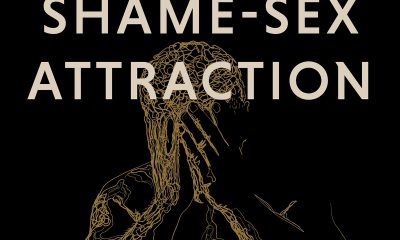
 Books4 days ago
Books4 days agoChronicling disastrous effects of ‘conversion therapy’
-
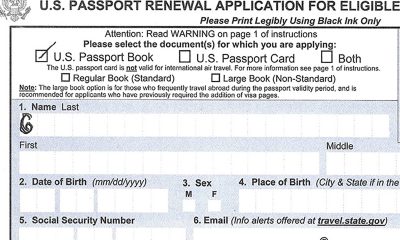
 U.S. Federal Courts3 days ago
U.S. Federal Courts3 days agoSecond federal lawsuit filed against White House passport policy
-
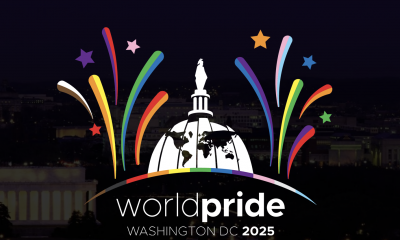
 Opinions3 days ago
Opinions3 days agoWe must show up to WorldPride 2025 in D.C.
-
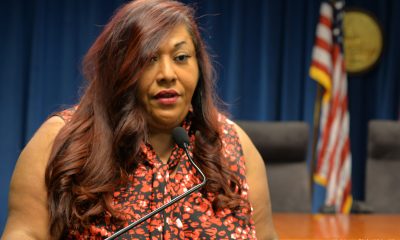
 District of Columbia3 days ago
District of Columbia3 days agoRuby Corado sentencing postponed for third time



